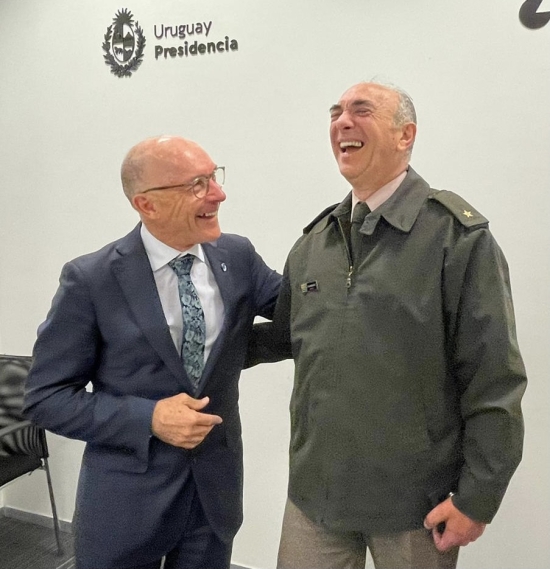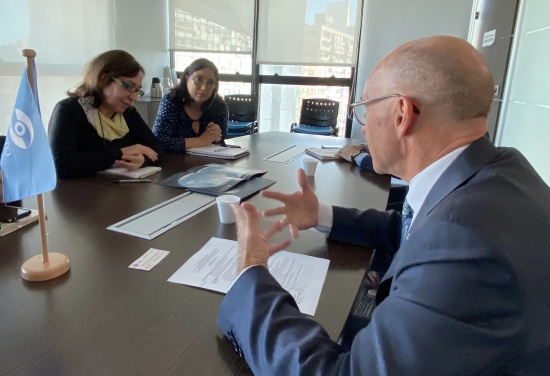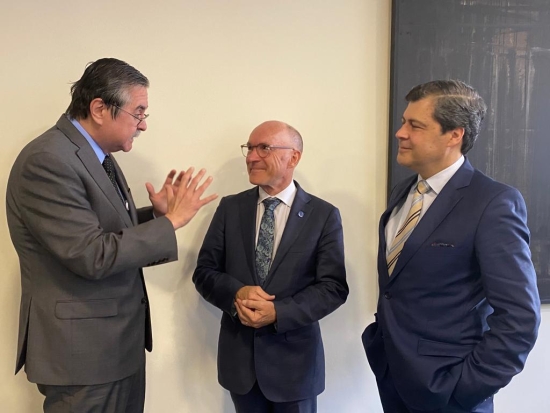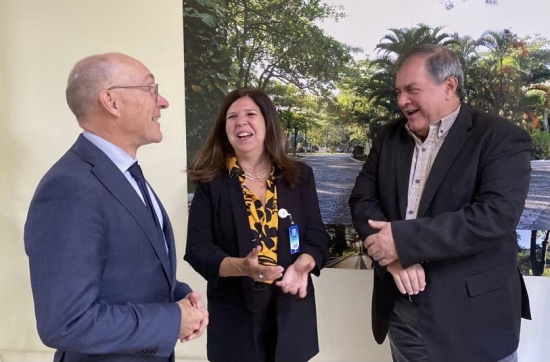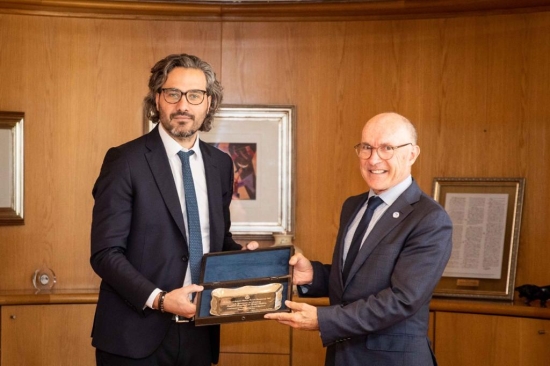CTBTO Head applauds South America for carrying torch of leadership in nuclear non-proliferation and disarmament
The Executive Secretary of the Comprehensive Nuclear-Test-Ban Treaty Organization (CTBTO), Robert Floyd, received affirmations of support for the Treaty during a multi-state trip to South America.
The CTBTO head kicked off the week-long tour in Montevideo, meeting with Colonel Esteban González, Deputy Director of SINAE, the Uruguayan national emergency agency. Floyd underscored the Organization’s potential for contributions to mitigating the consequences of natural disasters.
Floyd also met with senior officials from Uruguay’s Ministry of Environment, including Virginia Fernández Ramos, Director of the Environmental Information Division, Mónica Gómez Erache, advisor on issues related to the environment, and Mario Jiménez, National Directorate for Climate Change.
CTBTO’s Executive Secretary later expressed his gratitude to Uruguay’s Ministry of Foreign Affairs for supporting the Comprehensive Nuclear-Test-Ban Treaty (CTBT) during the 10th Review Conference of the Parties to the Treaty on the Non-Proliferation of Nuclear Weapons (NPT RevCon), held in New York in August.
Wrapping up the first portion of the trip, Floyd held a roundtable discussion with members of the Faculty of Science at the University of the Republic (UdelaR) to share insights on data from the Organization’s International Monitoring System (IMS), also inviting researchers from the institution to subscribe to the virtual Data Exploitation Centre (vDEC) and submit papers for CTBTO’s upcoming Science and Technology Conference (SnT 2023). vDEC provides access to CTBTO’s data to scientists and researchers from many different disciplines across the globe to conduct research.
The second part of the trip began in the Brazilian city of Sao Paolo, where Floyd met with the President of the National Centre for Monitoring and Early Warning of Natural Disasters (CEMADEN). The Centre was designated as Brazil's National Data Centre (NDC), which will receive, process, and analyse data from CTBTO’s International Data Centre (IDC) in Vienna, leading to the identification of ambiguous events. The data is also used for civil and scientific purposes.
After Sao Paolo, Floyd travelled to Brasilia where he had a lively discussion with students at the Rio Branco Institute, Brazil’s diplomatic academy, where he encouraged the country’s future diplomats to continue to pursue pathways to advance nuclear non-proliferation and disarmament under the country’s leadership.
In his remarks, Floyd also hailed the strong contributions made by the Treaty of Tlatelolco (the Treaty for the Prohibition of Nuclear Weapons in Latin America and the Caribbean).
Furthermore, he praised countries in the Latin America and the Caribbean region, all of whom have ratified the CTBT. The most recent country to sign and ratify the Treaty was Dominica, completing universal adherence to the CTBT across the region.
While in Brazil, Floyd met with Ambassador Paulino Franco de Carvalho Neto and Marcelo Câmara from the Ministry of Foreign Affairs, where he applauded the country’s political and technical support for the CTBT.
In a meeting with Brigadier Osmar Lootens Machado and Admiral Marcelo da Silva Gomes from the Office of the Presidency (GSI), Floyd was briefed on the GSI’s engagement in nuclear affairs and the status of IMS facilities in Brazil.
Floyd also visited the University of Brasilia’s Seismological Observatory, where he received a briefing on the institute’s work related to the CTBTO.
In Rio de Janeiro, Floyd met with the Directors of the Institute of Radioprotection and Dosimetry of the National Nuclear Energy Commission (IRD/CNEN). At IRD/CNEN, he was welcomed by CNEN President Roberto Pertusi, and IRD Director Maria Angélica Vergara Wassermann, as well as the Minister of Science and Technology and Innovation, Paulo Alvim. The minister reaffirmed Brazil’s support for the CTBT.
On the final leg of the Brazil trip, the Executive Secretrary visited the Brazilian-Argentine Agency for Accounting and Control of Nuclear Materials (ABACC), meeting with Secretaries Marco Marzo and Elena Maceiras.
Afterwards, in an interview with Globo newspaper, the CTBTO head spoke about the current security climate, highlighting the need for commitment to a global ban on nuclear testing.
Floyd next travelled to the Argentine capital, Buenos Aires, where he met with the board of directors of the Nuclear Regulatory Authority (ARN) of Argentina, Agustín Arbor González, Daniel Di Gregorio, and Marina Di Giorgio. During the tour, the CTBTO delegation visited two IMS facilities, where they were briefed on CTBT-ARN activities. Floyd hailed ARN for its technical expertise and strong commitment to maintaining the country's IMS facilities.
Floyd concluded his trip to South America in a meeting with the Foreign Minister of Argentina, Santiago Cafiero. The two discussed the importance of multilateralism in the nuclear non-proliferation regime. Foreign Minister Cafiero presented Floyd with a plaque in recognition of CTBTO’s contribution to the search for Argentine submarine ARA San Juan in November 2017.
While in Uruguay, Brazil and Argentina, Floyd took the opportunity to highlight the benefits of “National Data Centres-for-All”.
The initiative seeks to ensure that the benefits of CTBTO’s verification data are equitably distributed among Member States, and to assist those without National Data Centres (NDCs) to establish such capabilities.
13 Sep 2022

CTBTO Executive Secretary Floyd meets Colonel Esteban González, Deputy Director of SINAE, the Uruguayan national emergency agency
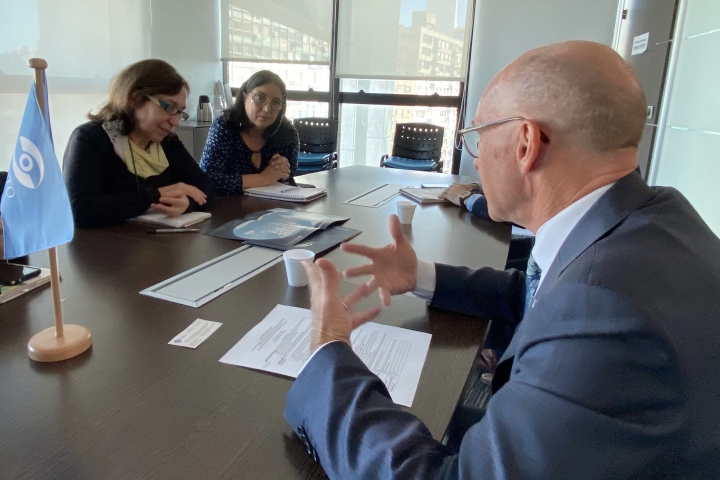
Floyd meets Officials from Uruguay’s Ministry of Environment: Virginia Fernández Ramos, Director of the Environmental Information Division, Mónica Gómez Erache, Advisor on issues related to the environment, and Mario Jiménez, National Directorate for Climate Change

Floyd meets officials from the Ministry of Foreign Affairs of Uruguay, Ricardo Gonzalez Director General for Political Affairs, and Gustavo Alvarez, Director of the Directorate for Multilateral Affairs
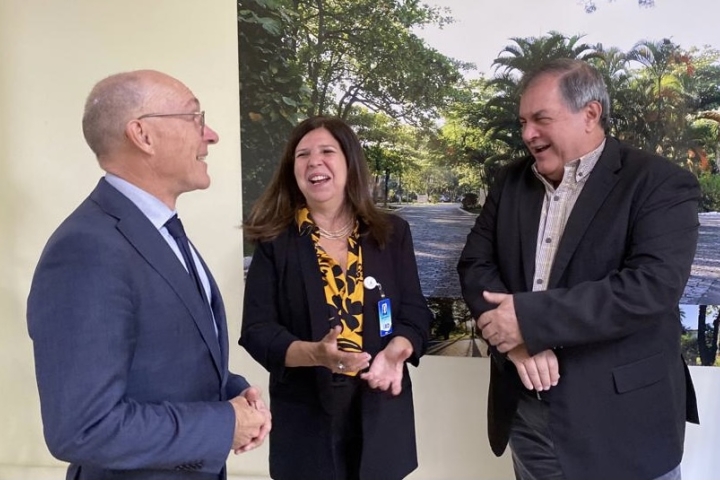
Floyd in a meeting with Brazil's Minister of Science, Technology and Innovation, Paulo Alvim and Director of the Institute for Radiation Protection and Dosimetry of the Brazilian Nuclear Energy Commission (IRD), Maria Angélica Vergara Wassermann
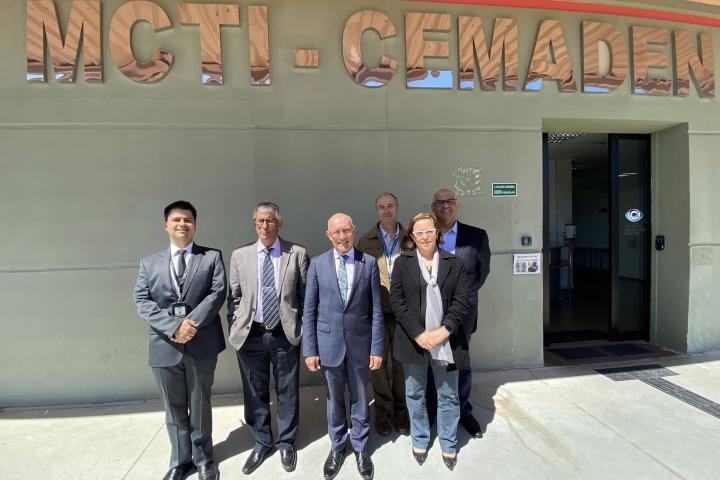
Floyd visits the National Centre for Monitoring and Alerting of Natural Disasters (CEMADEN) and meets with Director Osvaldo Moraes
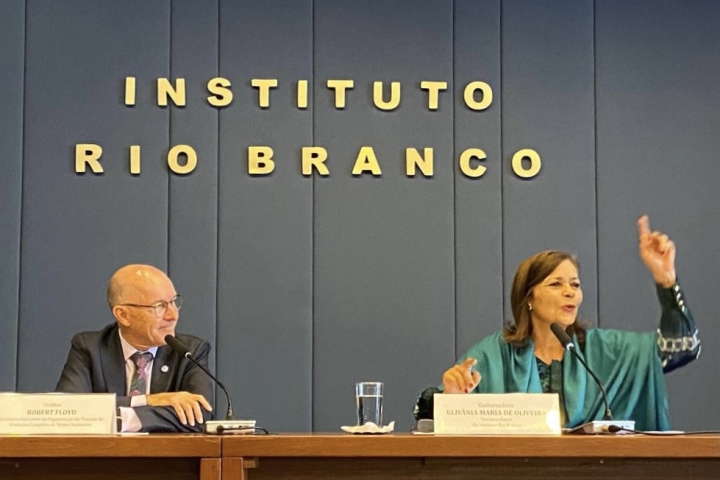
Floyd engages in a discussion with Ambassador Glivania Maria de Oliveira, Director General of the Rio Branco Institute
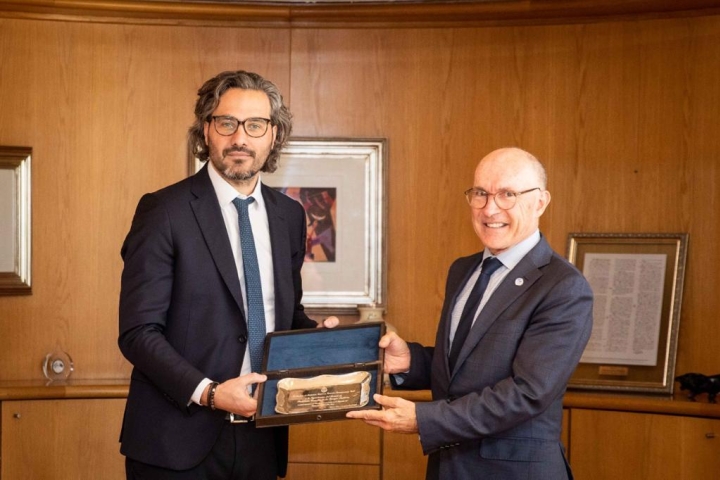
Floyd meets Argentina’s Foreign Minister Santiago Cafiero and receives a plaque
